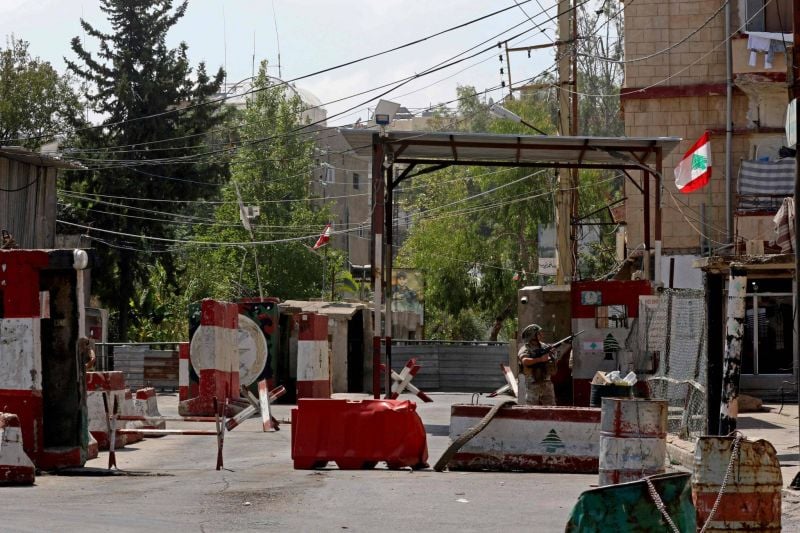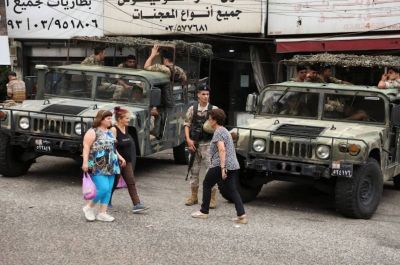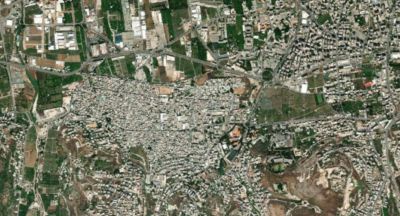
Soldiers operate a checkpoint at the entrance of the Ain al-Hilweh Palestinian refugee camp near Saida, following renewed clashes between the Fatah movement and Islamist groups, Sept. 9, 2023. (Credit: Mahmoud ZAYYAT/AFP)
On Thursday evening, the Ain al-Hilweh Palestinian refugee camp, located near the outskirts of Saida in southern Lebanon, was once again engulfed in flames. Clashes broke out between the Fatah movement, close to president of the State of Palestine, Mahmoud Abbas, and the Islamist group Jund el-Cham, forcing hundreds of residents to flee.
After a short ceasefire that lasted less than 12 hours, the fighting resumed Saturday morning.
This latest escalation comes after violent clashes broke out for several days in July, leaving 13 people dead.
Ain al-Hilweh, the largest Palestinian refugee camp in Lebanon, is home to around 80,000 of the country's 250,000 Palestinian refugees.
Under the Cairo Agreement signed in 1969 (but since abrogated), the Lebanese army does not deploy inside Palestinian camps in Lebanon, where security is provided by Palestinian factions.
Interviewed by L'Orient-Le Jour, Imad Salameh, professor of international relations at the Lebanese American University (LAU), explained that the continuation of clashes could be linked to the normalization efforts between Saudi Arabia and Israel. The outbreak of violence in the camp coincides with the Palestinian National Authority's requests that Riyadh include its demands in indirect negotiations with Israel.
How do you explain the resumption of inter-Palestinian fighting in Ain al-Hilweh after the lull of recent weeks?
The Palestinian question is quite complicated.
The United States is trying to find a political solution to the Arab-Israeli conflict in general and to the conflict between the Palestinians and the Hebrew state in particular, all within the framework of a Saudi intervention, which has given rise to an inter-Palestinian and regional crisis, as there are countries that do not want this agreement.
The situation in the Palestinian camps in Lebanon will worsen, especially in Ain al-Hilweh, where there are various rival political forces.
This is why Mahmoud Abbas has recently adopted a diplomatic tone [during his talks with Riyadh], far from confrontational, which does not please Hamas, the extremist Islamists and the Iranians and their allies, whether Islamic Jihad or Hezbollah.
There are more and more attempts to limit the role of Fatah in the camps and impose other security references.
What repercussions could the instability in the Ain al-Hilweh camp have on Lebanon?
What's happening in Ain al-Hilweh is dangerous, because the greater the number of security referents in the camp, the more difficult it will be to control the situation. If the camp does not regain a certain stability, the conflict could spread to other camps, such as Burj al-Brajneh or Shatila [in Beirut southern suburbs], for example. We can then expect anyone [among Lebanon's political players] to intervene in this conflict.
The more instability there is, the greater the negative repercussions will be, both for the inhabitants of the camp and for the Palestinian cause in general.
You can't separate these incidents from politics. Every time there is a political rapprochement with Israel, there will be an escalation in Ain al-Hilweh or in the other camps.
Can we one day hope for the disarmament of the Palestinian factions in the Lebanese camps?
If insecurity spreads to Ain al-Hilweh and the situation spirals out of control, we run the risk of a repeat of the 1975 scenario [the start of the Lebanese civil war]. This scenario is unlikely in the immediate future, but the camps are veritable powder kegs.
Let's not forget that the Popular Front for the Liberation of Palestine-General Command [PFLP-GC, close to the Syrian regime] has military bases in Lebanon, in the Bekaa and Haret al-Naameh, on the Chouf coast, for example.
Legally speaking, the Cairo agreement was rendered null and void by UN resolution 1559, which, among other things, calls for the disarmament of Lebanese and non-Lebanese militias in Lebanon, but these resolutions have never been implemented.
Will there ever be the political will to disarm the camps and restore Lebanese sovereignty? This is a complex issue and one that is opposed by the Lebanese, Syrians and Palestinians.

